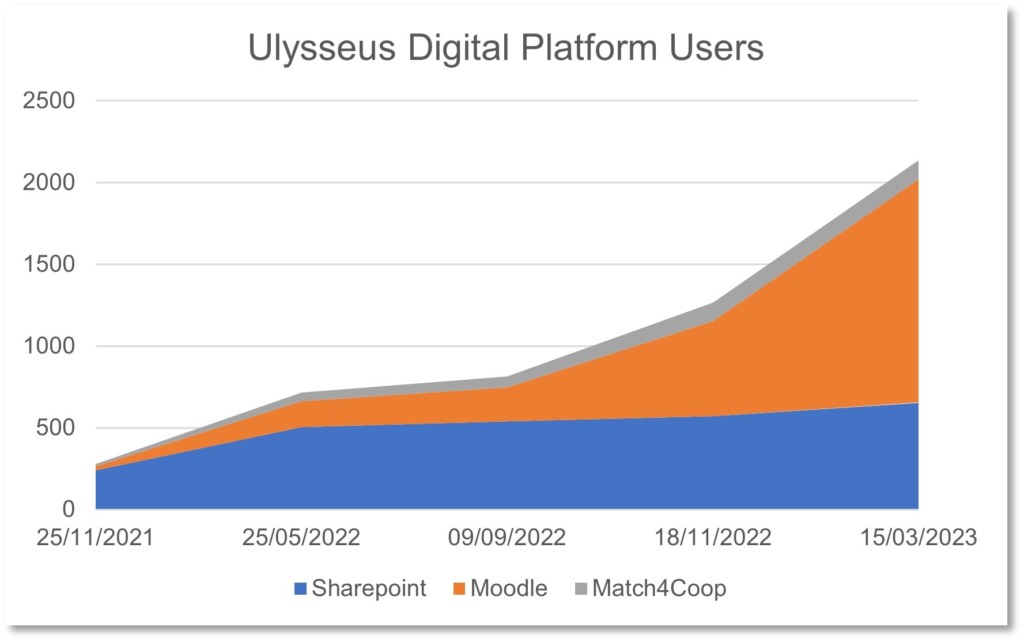
Kitte Marttinen & Mirjam Gamrasni
The integration of technology in higher education has enhanced accessibility, flexibility, engagement, and student autonomy, ushering in an evolving era of digital learning. To support this, the European Union has established an updated Digital Education Action Plan for 2021–2027, aiming to provide high-quality, inclusive, and accessible digital education to learners across Europe and beyond.
Ulysseus evolving landscape of Digital Learning in Europe
Ulysseus is one of the 50 European Universities selected by the European Commission to promote European values and identity while revolutionizing the quality and competitiveness of European higher education. Haaga-Helia is one of the eight partners in Ulysseus alliance, representing one of the few Universities of Applied Sciences involved in European Universities in Finland. Ulysseus enhances student mobility, research collaboration and internships, equipping European citizens with skills, such as digital literacy, multilingualism and an entrepreneurial mindset.
Digital learning in Europe offers numerous advantages. Firstly, it significantly increases accessibility by breaking down geographical barriers. Online platforms enable learners to access educational resources from anywhere, benefiting students in remote or underserved areas. This has been particularly advantageous for students with disabilities or personal limitations. Furthermore, digital learning fosters flexibility, enabling learners to tailor their education to their own pace, preferences, and needs.
Ulysseus employs a specialized Learning Management System (LMS) on its digital platform to deliver a comprehensive range of joint and co-created courses for the Ulysseus community and beyond. These include Massive Open Online Courses (MOOCs), self-paced courses and online courses on topics such as languages, entrepreneurship, and sustainable development. Ulysseus utilizes diverse digital tools, incorporating written, audio, and video materials from internal and external sources, while leveraging LMS resources.
Through fully automated courses, learners can engage in education at their own pace, promoting accessibility and internationalization at home. The co-created courses have garnered interest not only from the alliance’s students but also from learners worldwide. Within the first 6 months from the launch of the LMS and the first joint courses it has already gathered more than 1500 registered users (Figure 1). The academic offer of Ulysseus will be soon widened through joint European degrees and new open online courses and we anticipate an exponential growth in the number of users.

Benefits, challenges and future directions
While the benefits for students and teachers are evident, such as internationalization at home, accessible education, more diverse and wider course offering, enhancement of the digital pedagogical skills, deeper cross-cultural understanding and improved career opportunities, challenges persist. These challenges include evident legal and administrative barriers in establishing joint systems for eight diverse higher education institutions, as well as relatively low completion rates in open courses—a well-known phenomenon in MOOCs and other lifelong learning initiatives (Canchola González & Glasserman-Morales, 2020).
The development of the Ulysseus digital platform has proceeded smoothly, but there has been a lack of resources to support teachers. Additionally, automatic credit recognition in students’ home universities has encountered issues, hindering the expected flexibility and smooth progression for students. However, it is crucial to remember that the establishment of a new European University is a novel endeavor, and challenges are to be expected. The solution-oriented mindset of alliance members, the enthusiasm of students, and the support received from management will contribute to building a European University that caters to the citizens of the future.

Kitte Marttinen, PhD, Project Director, Haaga-Helia UAS, kitte.marttinen(at)haaga-helia.fi.
Mirjam Gamrasni, MA, International Project Officer, Haaga-Helia UAS, mirjam.gamrasni(at)haaga-helia.fi.
References
Canchola González, J.A & Glasserman-Morales, L.D (2020). Factors that influence learner engagement and completion rate in an xMOOC on energy and sustainability. Knowledge Management & E-Learning 12 (2), pp 129–146.
European Commission. (2020). Digital Education Action Plan 2021-2027. Resetting education and training for the digital age. Retrieved 12.6.2023 from https://education.ec.europa.eu/focus-topics/digital-education/action-plan.
European Commission. (n.d.). European universities initiative. Retrieved 12.6.2023 from https://education.ec.europa.eu/education-levels/higher-education/european-universities-initiative-



